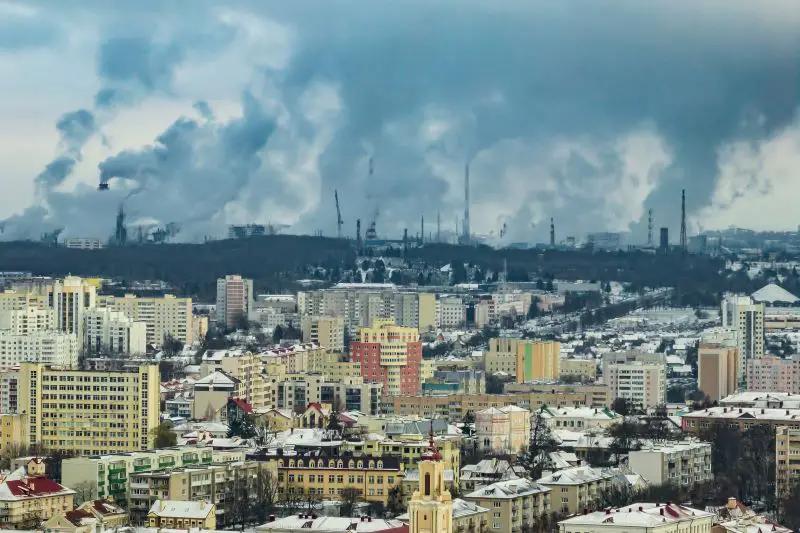Click here to get this post in PDF
Due to tariffs on imports from other countries, the stock market has become more volatile, and prices of consumer goods in the U.S. continue to rise. Feeling bleak about their financial futures, Americans are trying to cut back on spending. Meanwhile, the unemployment rate inched up in the first quarter of 2025 and currently hovers around 4 to 4.2 percent.
According to Keith Lambert, President of the air pollution control systems company Oxidizers Inc., tariffs could have another adverse side effect that has mostly gone unexamined: complicating progress toward environmental goals.
“Tariffs are and should be used as an equalizer, basically a balancing tool,” Lambert says. “But the current tariff war, depending on how long it ends up lasting, can absolutely have a negative impact on environmental progress.”
The possibility of a tariff-induced global recession
While some tariffs were initially (albeit temporarily) rolled back for 90 days, this time has since passed. Meanwhile, there is still a nearly universal 10 percent tariff in place, and imports from China continue to be targeted with a 145 percent tariff.
Given this state of affairs and the volatility of policies, Reuters reports that 60 percent of surveyed economists currently rate the risk of a global recession as “high” or “very high.” The International Monetary Fund (IMF) not only recently decreased its forecast for global economic growth this year but has also suggested that the U.S. will suffer the most.
When domestic alternatives do not exist
While Lambert hopes the current trade war won’t trigger a recession and that tariffs won’t isolate different geographic regions of the world from one another, he concedes that these possibilities could still occur. If they do, then he predicts manufacturers would need to “scramble to get coverage for a swath of products,” which could delay their ability to bring their offerings to market.
Indeed, economists say that rebuilding American manufacturing to replace imports would take years. In the meantime, small businesses find themselves at risk of going out of business due to high tariff fees for items that cannot be sourced domestically.
In addition, foreign countries have reacted to tariffs with backlash, instituting their own tariffs and boycotting American products. For this reason, tariffs are having a devastating effect on American agriculture, as the Chinese and other countries cancel orders for U.S. farm products.
Additionally, clean manufacturing could become more challenging and costly under tariffs.
How tariffs could hurt clean manufacturing
“Tariff impacts aren’t always in your face,” Lambert explains. “The globalization behind many products we’ve become accustomed to goes way beyond the surface. It also ties into the manufacturing and manufacturing equipment that makes those products, as well as the pollution-control equipment that keeps our air clean.”
For example, Lambert’s own company manufactures oxidizers and other critical equipment that help heavy industry keep pollution under control. “Most environmental equipment, maintenance, rebuilds, and replacements are part of the overall daily operation costs deeply embedded in keeping the production line running,” he says. “To put it simply, if we can’t maintain this gear or replace it when it breaks, then the pipeline stops. It would take longer to fulfill orders — in some cases, potentially much longer.”
Moreover, manufacturing, maintaining, and replacing this kind of equipment requires parts and materials sourced overseas. The more expensive these goods become, the more costly manufacturing becomes.
How tariffs could increase costs
“Should original equipment manufacturers of anti-pollution equipment like me start to face increased costs associated with steel, materials, and supply chain holdups, then it will inevitably factor into overall production costs,” Lambert explains. “These pollution-control technologies are the backbone of industry. They are required to make the products that our contemporary lifestyles rely on. Limiting the amount of pollution from manufacturing processes not only affects employees and neighbors, but also the general environment.”
In particular, Lambert states that certain tariffs would negatively impact the pollution control industry more than others. “Tariffs placed on materials required to manufacture sensitive environmental sensors, systems, etc., could slow down the supply chain,” he explains. “Also, items associated with environmental equipment, like ceramic media, could end up requiring re-engineering of certain systems. Although that would depend on their original design.”
According to Lambert, the pollution-control industry enjoys a bit of a buffer that could help forestall the negative effects of the tariffs, at least for a time. “The good news is that most environmentally focused equipment is available globally,” he says. “This means associated components, parts, etc., are generally accessible. In many cases, there’s decent market saturation already in play.”
More headwinds for environmental progress
While the exact impact of these tariffs has yet to be seen, current trade policy can be expected to affect almost every aspect of industry worldwide. Manufacturing’s pollution-control systems are no exception.
In 2024, before these recent events, the Union of Concerned Scientists had already warned that the world was falling behind in meeting its environmental goals, and the probability that the planet would warm to dangerous levels was higher than ever.
Also read:
How Marine Engineers Are Developing Environmental Sustainability in Ship Design and Operations
Individual Measures That Can Be Taken To Prevent Water Pollution
Image source: elements.envato.com

